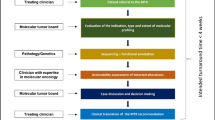Summary
Genes involved in cancer generation are usually tumor suppressors and oncogenes. Progressive genetic alterations in these genes are involved in the mechanisms of tumorigenesis. In prostate cancer, additionally several chromosomal loci that should harbor mutated genes have been proposed. Some genes have been found altered in prostate cancer, such as PTEN, TP53, AR, RNASEL (HPC1), ELAC2 (HPC2), CDKN2A and MSR1 and those can be natural targets for new strategies of treatment. Besides, gene therapy has been suggested to be suitable for prostate cancer treatment. This approach includesex vivo corrective therapy, suicide, and antisense therapy.
Similar content being viewed by others
References
Smith JR, Freije D, Carpten JD, et al. Mayor susceptibility locus for prostate cancer on chromosome 1 suggested by a genome-wide search. Science. 1996;274: 1371–4.
Makridakis N, Ross RK, Pike MC, et al. Association of mis-sense substitution in SRD5A2 gene with prostate cancer in African-American and Hispanic men in Los Angeles, USA. Lancet. 1999;354:975–8.
Makridakis N, Ross RK, Pike MC, et al. A prevalent missense substitution that modulates activity of prostatic steroid 5alphareductase. Cancer Res. 1997;57:1020–2.
Nam RK, Toi A, Vesprini D, et al. V89L polymorphism of type-2, 5-alpha reductase enzyme gene predicts prostate cancer presence and progression. Urology. 2001;57:199–204.
Elo JP, Visacorpi T. Molecular genetics of prostate cancer. Ann Med. 2001;33:130–41.
Bookstein R. Tumor suppressor genes in prostate cancer. In: Chung LW, Isaacs WB, Simons JW, eds. Prostate cancer: biology, genetics, and the new therapeutics. Totowa: NJ; Humana Press; 2001. p. 61–93.
Alcaraz A, Barranco MA, Corral JM, et al. High grade prostate intraepithelial neoplasia shares cytogenetic alterations with invasive prostate cancer. The Prostate. 2001;47:29–35.
Brown JA, Alcaraz A, Takahashi S, Persons DL, Lieber MM, Jenkins RB. Chromosomal aneusomies detected by fluorescent in situ hibridization (FISH) analysis in clinically loclized prostate carcinoma. J Urol. 1994;152:1157–62.
Alcaraz A, Takahashi S, Brown JA, et al. Jenkins. Trisomy 7 and aneuploidy are potential markers of poor prognosis in prostate cancer. Cancer Res. 1994;54: 3998–4002.
Reiter RE, Sato I, Thomas G, et al. Coamplification of prostate stem cell antigen (PSCA) and MYC in locally advanced prostate cancer. Genes Chromosomes Cancer. 2000;27:95–103.
Porkka K, Saramaki O, Tanner M, Visakorpi T. Amplification and overexpression of Elongin C gene discovered in prostate cancer by cDNAmicroarrays. Lab Invest. 2002;82:629–57.
Saramaki O, Willi N, Bratt O, et al. Amplification of EIF5S3 gene is associated with advanced stage inpfustate cancer. Am J Pathol. 2001;159:2089–94.
Dhanasekaran SM, Barrette TR, Ghosh D, et al. Delineation of prognostic biomarkers in prostate cancer. Nature. 2001;412: 822–6.
Jiang Z, Woda BA, Rock KL, et al. P504S: A new molecular marker for the detection of prostate carcinoma. Am J Surg Pathol. 2001;25:1397–404.
Rubin MA, Zhou M, Dhanasekaran SM, Varambally S, Barrete TR, Sanda MG. A-methylacyl coenzyme A racemase as a tissue biomarker for prostate cancer. JAMA. 2001;287:1662–7Q.
Luo J, Zha S, Gage WR, et al. Alpha-methyl CoA racemase: a new molecular marker for prostate cancer. Cancer Res. 2002;62:2220–6.
Carmichael MJ, Veltri RW, Partin AW, et al. Deoxyribonucleic acid ploidy analysis as a predictor of recurrence following radical prostatectomy for stage 12 disease. J Urol. 1995;153:1015–9.
Theodorescu D, Broder SR, Boyd JC. p53, Bcl-2 and retinoblastoma proteins as long-term prognostic markers in localized carcinoma of the prostate. J Urol. 1997;158:131–7.
Moul JW. Angiogenesis, p53, bcl-2 and Ki-67 in the progression of prostate cancer after radical prostatectomy. Eur Urol. 1999;35:399–407.
Khoo VS, Pollack A, Cowen D, et al. Relationship of Ki-67 labeling index to DNA-ploidy, S-phase fraction, and outcome in prostate cancer treated with radiotherapy. Prostate. 1999;41:166–72.
Stattin P, Damber JE, Karlberg L, et al. Celr proliferation assessed by Ki-67 immunoreactivity on formal in fixed tissues is a predictive factor for survival in prostate cancer. J Urol. 1997;157:219–22.
Richmond PJ, Karayiannakis AJ, Nagafuchi A, Kaisary AV, Pignatelli M. Aberrant E-cadherin and alpha-catenin expression in prostate cancer: correlation with patient survival. Cancer Res. 1997;57:3189–3.
Umbas R, Isaacs WB, Bringuier PP, et al. Decreased E-cadherin expression is associated with poor prognosis in patients with prostate cancer. Cancer Res. 1994; 54:5929–3.
McMenamin ME, Soung P, Perera S, et al. Loss of PTEN expression in paraffin-embedded primary prostate cancer correlates with high Gleason score and advanced stage. Cancer Res. 1999;59:4291–6.
Krasilnikov M, Adlet V, Fuchs SY, et al. Contribution of phosphatidylinositol 3-kinase to radiation resistance in human melanoma cells. Mol Carcinog. 1999;24: 64–9.
Scherr DS, Vaughan ED, Wei J, et al. BCL-2 and p53 express ion in clinically localized prostate cancer predicts response to external beam radiotherapy. J Urol. 1999;162:12–7.
Crawford ED, Eisenberger MA, McLeod DG, et al. A controlled trial of leuprolide with and without flutamide in prostatic carcinoma. N Engl J Med. 1989;17;321(7): 419–24. Erratum in: N Engl J Med. 1989; 321(20):1420.
Harris JD, Gutiérrez AA, Hurst HC, Sikora K, Lemoine NR. Gene therapy for cancer using tumour-specific prodrug activation. Gene Ther. 1994;1(3):170–5.
O'Keefe DS, Uchida A, Bacich DJ, et al. Prostate-specific suicide gene therapy using the prostate-specific membrane antigen promoter and enhancer. Prostate. 2000;45(2):149–57.
Author information
Authors and Affiliations
Corresponding author
Rights and permissions
About this article
Cite this article
Cansino Alcaide, J.R., Martínez-Piñeiro, L. Molecular biology in prostate cancer. Clin Transl Oncol 8, 148–152 (2006). https://doi.org/10.1007/s12094-006-0004-1
Issue Date:
DOI: https://doi.org/10.1007/s12094-006-0004-1




